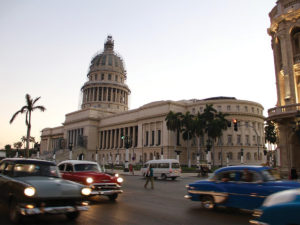
On Wednesday, Nov. 8, the Trump administration restricted access to Cuban hotels, businesses and stores, in an attempt to constrict the economic embargo on Cuba. According to a Trump official, the Trump administration’s decision to constrict travel rules to Cuba is “intended to steer economic activities away from the Cuban military, intelligence and security services … and encourage the government to move toward greater economic freedom.” However, the decision seems more like an attempt to merely blacklist companies and expunge Obama’s decision to restore diplomatic ties with Cuba.
The restriction limits the person-to-person travel that was unbarred under the Obama administration in 2014. Individual visits from the United States will, in most circumstances, no longer be allowed. The Trump administration created a “Cuba Restricted List” which includes 180 entities, including 83 hotels. These businesses are all said to be tied to the Cuban military, intelligence or secret service. The White House has claimed that this ban will obstruct the Cuban military, secret service and intelligence from benefitting from American tourists and trade.
By banning Americans from doing business with specific Cuban companies, Trump is merely punishing Cubans and their newfound economic prosperity that is based on American trade and tourism. While the Trump administration claims that this punishment will push Cuba to gain economic freedom that is not merely reliant on American trade and tourism, President Donald Trump has previously blamed Cuba for unexplained attacks against US diplomats on the island, so it is difficult not to question whether this ban has any connection to the White House’s accusations.
According to the Commerce, Treasury and State Departments, blocking Americans from businesses linked to the Cuban government will prompt Americans to focus their money on private Cuban businesses. This will accordingly grant the Cuban economy to stray away from the Cuban military and instead focus on economic freedom. However, the Trump administration’s endeavor to push Cuba to gain economic freedom and give up its communist ties is hypocritical. Trump was in China, a communist country, at the same time that the regulations were announced.
Trump’s attempt to punish a communist country while pandering to China is ludicrous. This contradiction raises the question of why the ban is necessary in the first place and what it is intended to do. If it really is an attempt to push Cuba towards economic freedom, then it is difficult to understand why the Trump administration has not attempted to do so with other notable communist countries.Trump’s pandering to China discredits any claims that he wishes to help Cuban citizens.
After the Obama administration ended the more than 50-year diplomatic isolation from Cuba, Trump criticized the decision. During his campaign, Trump stated in a Twitter post that, “If Cuba is unwilling to make a better deal for the Cuban people, the Cuban/American people and the U.S. as a whole, I will terminate deal.” In June, when Trump first announced the cession of Obama’s decision to restore diplomatic ties with Cuba, Trump claimed that the policy was a “Terrible and misguided deal with the Castro regime.” Based on Trump’s notable disdain for the prior Democratic administration, his decision to end one of Obama’s notable and highly esteemed decisions, also hints at a blunt attack against Obama’s legacy.
The Trump administration’s embargo on American tourism and trade with Cuban businesses holds no true substance or purpose. While the administration claims that the embargo is some type of gallant attempt to push Cuba to gain economic freedom, its motives are questionable. Trump’s allegations against Cuba being behind unexplained attacks against Americans, his disdain for any decisions made by the Trump administration and most importantly, his contradictory support of communist China, undermine the legitimacy of the embargo.








